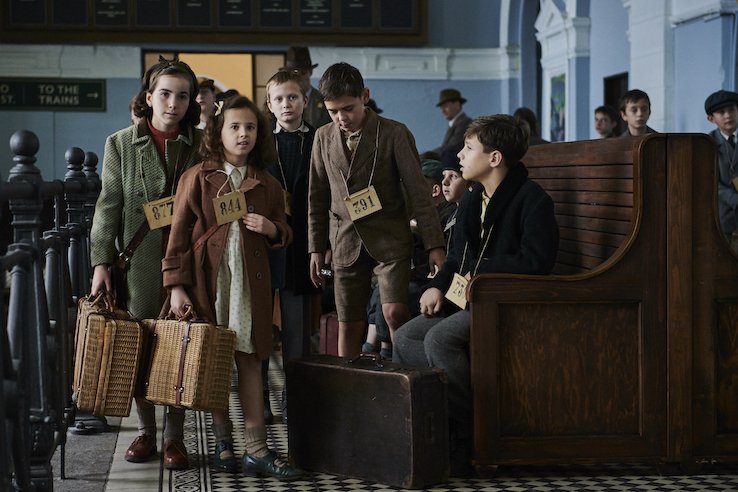Ordinary ‘LIfe’
Anthony Hopkins headlines a historical biopic that’s good for you, but not necessarily a great watch.
One Life
Director: James Hawes • Writers: Lucinda Coxon, Nick Drake, based on the book by Barbara Winton
Starring: Anthony Hopkins, Johnny Flynn, Helena Bonham Carter, Romola Garai, Lena Olin
UK • 1hr 49mins
Opens Hong Kong March 21 • I
Grade: B-
One Life couldn’t scream “BBC Films” louder if it tried. It’s like broccoli or spinach. It’s good for you, and it imparts knowledge that should be more widely known efficiently. This time around that efficiency serves telling the story of ordinary London stockbroker Nicholas Winton who, upon learning of the random violence and arrests targeting Jews in German-occupied Czechoslovakia ahead of a looming Nazi invasion, gets his ass in gear and gets the kindertransport up and running in 1938. Eventually, Winton alone managed to ferry 669 mostly Jewish children to foster homes in the UK before the Second World War erupted and the death camps opened.
Director James Hawes has finely honed television skills – Slow Horses, Black Mirror, Penny Dreadful – and he shows them off in One Life, and its legit hard to tell if that’s a good thing or not. The commercial breaks are baked into the editing, so they won’t feel disruptive when the film eventually lands on the Beeb. But it makes for very staid, very workmanlike filmmaking, devoid of flair and filmmaking imagination. There’s an expected flashback device; most of the children and the parents so desperate they willingly give their kids to strangers are more symbols than people. Perhaps given the subject matter that’s the way to go, but Jonathan Glazer deployed formal creativity for a related story, so we know aesthetic innovation doesn’t detract from theme and content – and can in fact enhance it. Perhaps, perhaps, straightforward plotting and minimal subtext is also the way the go seeing as pushback on Holocaust denial is necessary these days.
One Life begins with Winton, (Anthony Hopkins) getting chewed out by his wife Grete (Lena Olin) for keeping too many banker’s boxes and too much junk in the house, particularly when they’ll need the space for their any-minute-now grandchild. When Grete goes away for a weekend, Winton reflects on the content of the boxes, and of an attaché case he keeps stored in his desk. The case contains a scrapbook compiled in the late 1930s, when he was a young man (played by Stardust’s Johnny Flynn) going back and forth between Prague and London, trying to save at-risk Jewish children from the invading Nazis by getting them on the kindertransport: dedicated trains traversing increasingly German-occupied Europe, to get the kids to relative safety with foster homes in the UK. The case belonged to one of the people helping the cause back in the day, Trevor Chadwick (Alex Sharp), one of many Winton doesn’t know the fates of, and which still haunts him in 1988. The film goes to great lengths to stress how ordinary Winton, Chadwick and another train organiser, Doreen Warriner (Romola Garai), were, and how ordinary people do have power.
After lunch with fellow activist Martin Blake (Jonathan Pryce), Winton is persuaded to speak to a Holocaust historian, Betty Maxwell (Marthe Keller), who in turn passes the scrapbook on to her media mogul husband. That’s how British prime time staple That’s Life! gets its hands on it, and brings Winton’s story to light after 50 years in obscurity. It also gives Winton a modicum of closure all those years later.
One Life is unsurprisingly sanitised, and even manages to weave a good degree of British Exceptionalism into the story. Nowhere is it mentioned that the kindertransport stopped in the Netherlands, France and Belgium (albeit not as many kids entered those countries), and neither is the UK’s reluctance to accept Jewish refugees during the actual fucking Holocaust during the war. There’s a snarky comment about FDR being “a fat lot of good.” Parliament loves to trot out the train and hold it up as proof of the UK’s humanitarian legacy despite repeated failures. And then the BBC “forgot” (allegedly) to mention the children being whisked to safety were mostly Jewish in its press materials for the film in January. But that’s another debate, and this film isn’t about WWII or mercenary government policy or anti-semitism. It’s about Nicholas Winton and on that front it’s fine, largely due to 86-year-old Hopkins’s intellectually and emotionally spry performance; his physical doddering can be forgiven when he makes genuine humility and lingering regret so palpable. The supporting cast does its job, particularly Helena Bonham Carter as Winton’s mother Babi, who shines in a brilliant take-down of a pencil-necked immigration bureaucrat early in the mission. But its Hopkins’s movie, and in truth, anyone who doesn’t find the recreation of Winton’s reunion with one of his kids on live TV (the real deal is up on YouTube) is likely dead inside, or close to it. See your doctor. — DEK



